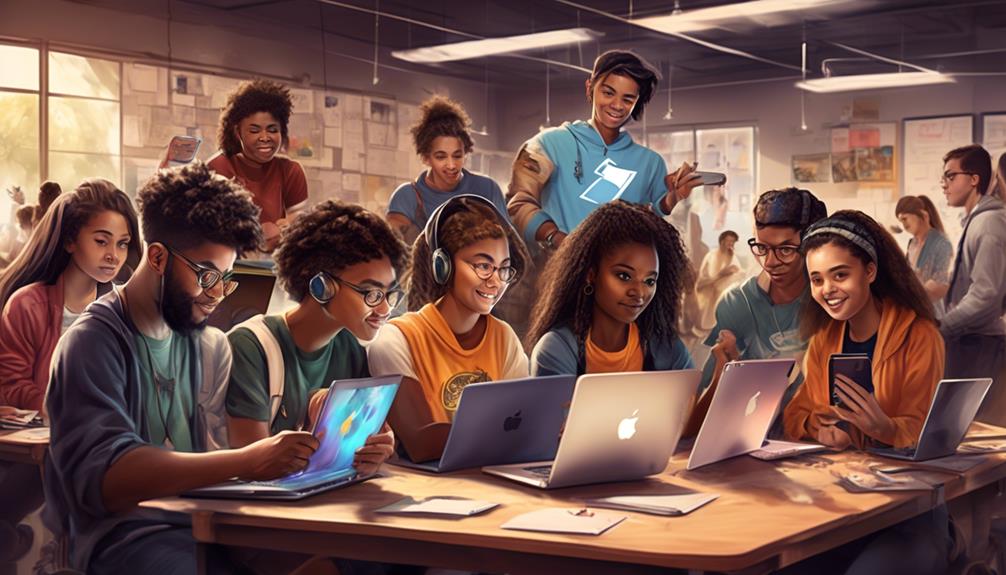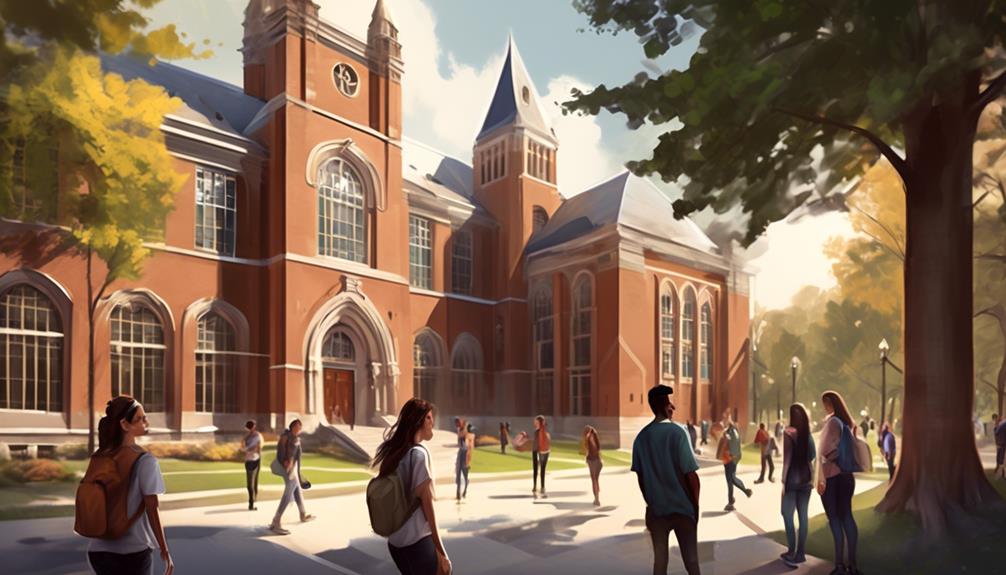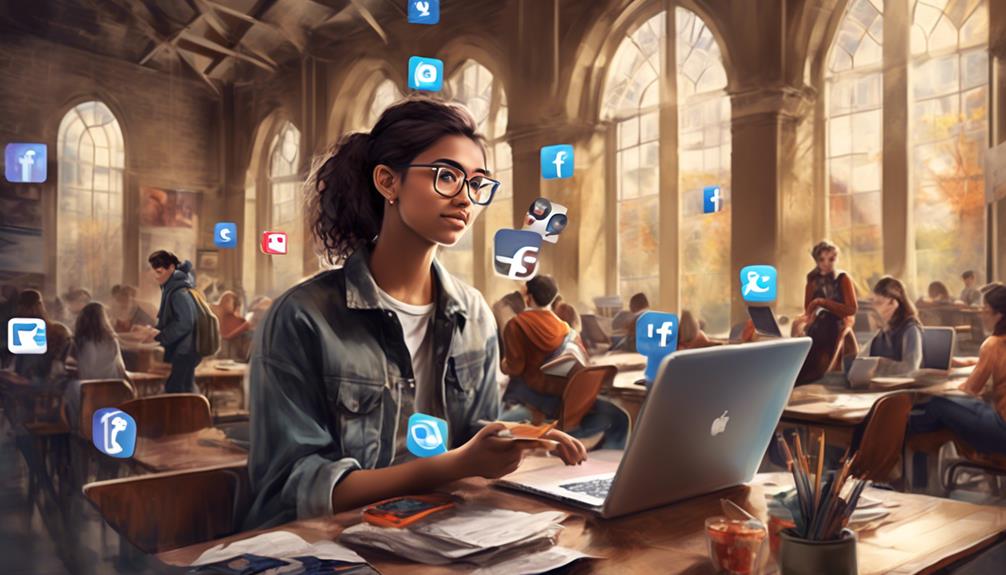As educators, we often worry about the potential distractions and misuse of social media in higher education. However, when used strategically, social media can be a powerful tool for enhancing student engagement, fostering community, and promoting institutional values.
The impact of social media on higher education is multifaceted, and in this discussion, we will explore the various ways in which it can positively influence the student experience, academic communication, and institutional outreach.
From leveraging user-generated content to shaping enrollment strategies, the role of social media in higher education is far-reaching and worthy of exploration.
Key Takeaways
- Social media plays a crucial role in promoting institutional values, enhancing student engagement, and developing new learning opportunities in higher education.
- Utilizing user-generated content, live streaming of campus events, and fostering professional networking opportunities are effective best practices for social media usage in higher education.
- Social media is a powerful tool for marketing in higher education as it builds institutional brand, engages with the community, and reaches prospective students and alumni.
- Success stories and case studies from institutions like Columbia University, University College London, University of British Columbia, Seneca College, and MIT highlight the impactful and diverse use of social media in higher education.
Advantages of Social Media in Higher Education

Social media offers numerous advantages in higher education. It allows institutions to effectively promote their values, connect with alumni, enhance student engagement, and develop new learning opportunities.
Higher education institutions can use social media as a powerful tool to showcase their mission, behavior expectations, sustainability efforts, and student accomplishments. This not only boosts brand awareness but also attracts prospective students who resonate with the institution's values and initiatives.
Additionally, social media provides a platform to connect with alumni, fostering relationships, and supporting fundraising efforts through social networks, events, and advocacy.
Moreover, the use of user-generated content (UGC) can significantly enhance student engagement. By leveraging student-generated content and institution-specific hashtags, universities can create a sense of community and belonging. Organizing social media contests further encourages student participation and interaction.
Furthermore, social media presents an opportunity to develop new learning opportunities by incorporating research tools, discussions, critical analysis, course-based hashtags, and resources for information literacy. This not only enriches the learning experience but also fosters a collaborative and interactive academic environment.
In essence, social media has become an integral part of the social media marketing strategy for higher education institutions, offering multifaceted benefits for student engagement, brand awareness, and community building.
Importance of Social Media in Higher Education
With an increasingly digital landscape, higher education institutions must recognize the pivotal role of social media in fostering global communication, community building, and institutional advancement.
Social media is instrumental in promoting institutional values and achievements, connecting with alumni, and boosting fundraising efforts. It also harnesses user-generated content to develop new learning opportunities and enhance student engagement and communication.
In the realm of student recruitment, social media plays a crucial role in showcasing campus life, academic programs, and student experiences. Aspiring students use social media platforms to engage in virtual tours and targeted advertising campaigns. This not only increases student engagement but also boosts the university's marketing efforts.
Furthermore, social media analytics provide valuable data for making informed decisions, tracking engagement metrics, and identifying trends. This data-driven approach enables higher education institutions to formulate effective strategies for institutional expansion and community building.
Best Practices for Social Media Usage

After recognizing the pivotal role of social media in fostering global communication and institutional advancement, it's crucial to establish best practices for its usage within higher education institutions.
Educational institutions should develop a clear strategy outlining how social media will be used to promote institutional values, achievements, and community engagement. Utilizing user-generated content can enhance student engagement and provide authentic representation of campus life. This approach fosters a sense of community and belonging, which is attractive to both current students and prospective students.
Additionally, universities and colleges can use platforms like Facebook and Instagram for live streaming to showcase campus events and share engaging content. Social media also provides an avenue for fostering professional networking opportunities by connecting students with industry professionals and alumni.
Furthermore, it's essential to implement a crisis management strategy to effectively communicate emergency alerts and address rumors or misinformation during crises. Regularly monitoring social media analytics allows for data-driven decisions, guiding future strategies and campaigns.
These best practices ensure that social media is used effectively to benefit the higher education community.
Role of Social Media in Marketing for Higher Education
Utilizing social media platforms effectively amplifies our higher education institution's marketing efforts, fostering connections with alumni and prospective students while showcasing our values and achievements.
Social media plays a pivotal role in marketing for higher education, allowing universities to build their brand and engage with the community. By leveraging various social media platforms, institutions can reach prospective students, communicate their values, and highlight achievements. Engaging content on social media platforms can attract and retain students, ultimately contributing to the institution's marketing strategy.
Furthermore, social media provides an avenue for universities to connect with alumni, maintaining relationships and fostering a sense of community. Through targeted marketing efforts on social media, higher education institutions can effectively communicate their unique selling points and offerings to a wider audience. This engagement not only enhances the visibility of the institution but also creates a space for meaningful interactions and connections with students, alumni, and the broader community.
Leveraging the power of social media in marketing for higher education is essential for building a strong and recognizable institutional brand while effectively reaching prospective students and engaging with the wider community.
Success Stories and Case Studies

From successful marketing endeavors to impactful engagement strategies, social media in higher education has generated numerous success stories and case studies.
These success stories highlight how institutions have effectively utilized social media platforms to engage with their students and promote their initiatives. For instance, Columbia University's Giving Day Campaign raised nearly $30 million from over 19,229 donors, showcasing the power of social media in fundraising efforts.
Similarly, University College London leverages social media to promote its curriculum, faculty, and campus culture, enhancing its outreach to prospective students and stakeholders. Moreover, the University of British Columbia effectively showcases innovation in the sciences on Twitter, utilizing the platform to highlight the institution's research and achievements.
Seneca College's use of social media and Sprout's capabilities during a staff strike demonstrates the importance of a robust social media strategy in managing crisis situations.
Additionally, MIT's dedicated social media hub brings content from all their channels together, showcasing the institution's cohesive and impactful social media presence in higher education.
These case studies emphasize the significant role of social media in shaping the higher education landscape and enhancing institutional outreach and engagement.
Frequently Asked Questions
What Is the Role of Social Media in Higher Education?
We believe social media plays a vital role in higher education, enabling us to connect with students, alumni, and the community. It helps promote institutional values, enhance student engagement, and support recruitment and fundraising efforts.
How Social Media Is Important in Education?
We use social media to enhance education by expanding communication, engaging students, and leveraging data-driven decisions. It supports recruitment, crisis management, and professional networking, amplifies institutional messages, and integrates with online learning platforms.
How Does Social Media Influence University Students?
Social media influences university students by shaping their perspectives and interactions. It fosters connections, empowers collaboration, and amplifies voices. Like a digital compass, it guides us through the ever-changing landscape of academia, fostering growth and community.
What Are the Problems With Social Media in Education?
We face challenges dealing with maintaining brand image, information accuracy, negative feedback, and privacy concerns on social media. It's crucial to keep up with the evolving landscape. Balancing these demands in education can be complex.
Conclusion
In conclusion, social media in higher education offers a wide range of benefits. This includes promoting institutional values and enhancing student engagement. Some may argue that social media can be a distraction for students. However, with proper guidelines and strategies, it can be a powerful tool for communication and learning.
By leveraging the opportunities presented by social media, higher education institutions can effectively connect with their audience. This can help drive enrollment and showcase their unique offerings.




